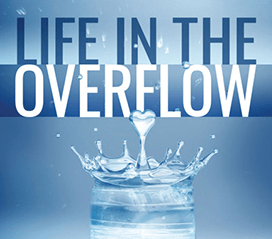
“Mixed Feelings,” on Life in the Overflow
A review of Life in the Overflow, by Chuck Ammons
I was recently offered the opportunity to review a book whose title intrigued me—“Life in the Overflow.” Books that offer a glimpse at a deeper walk with God always appeal to me. After reading the book, though, I have mixed feelings. I recommend it—with cautions.
It doesn’t take long to realize that the author, Chuck Ammons is enthusiastic and passionate about his subject. His enthusiasm is contagious and it is one of the elements that I like about this book. Ammons has experienced something that he wants everyone to experience. In this way, the book is authentic. Ammons overflows with excitement, he splashes everyone who reads his book and he wants everyone to get wet and overflow, also.
Another facet of the book that I appreciate is Ammons proclamation that there is more to the life of faith than most of us are experiencing. I think he is right. The socially acceptable brand of Christianity that is commonly on display in our world today is a far cry from the lives that have been radically transformed by God’s love and grace, which we see portrayed in the Scriptures. We content ourselves with second best. Ammons reminds his readers that there is more—much more—to the life of faith, and the way to receive more is to let go of what we have.
That’s what I liked about the book. Before I list a couple of areas with which I am uncomfortable and in disagreement I must point out some obvious differences between Mr. Ammons and me. I would identify Ammons with these labels: conservative evangelical and Pentecostal. Though we are brothers in Christ, we come from different branches of the family. I’m an ordained Lutheran pastor. Though I grew up in a pietistic wing of the Lutheran Church, I now identify myself as a progressive Christian.
One of the points that Ammons makes is that in order to experience an overflowing life we much identify ourselves as saints. He goes on to point out several Bible passages that call followers of Christ, saints. I agree that we are saints, but I also believe that Martin Luther’s saying that we are “at the same time sinners and saints to be true.” If we ignore that fact that we are sinners, we tend to construct a castle of self-righteousness. Focusing on our sainthood, temps us to believe that sainthood is a position that we have earned rather than a status that we have been given through the life, death and resurrection of Jesus Christ.
Telling ourselves that we are only saints is telling ourselves a lie. Certainly, Paul was a saint, but in Romans he writes, “Wretched man that I am, who will deliver me!” David was a man after God’s own heart, but he raped Bathsheba and murdered her husband. Peter was a devoted disciple, but he cowardly denied Jesus. We aren’t just saints. We need to deal with both our saintliness and our sinfulness.
Another theme that Ammons stresses is authority and dominance. There is one touching story about how Ammons and his young son claim their authority and boldly minister to the homeless community in their town. A majority of his other examples of claiming authority and dominion deal with religious experiences such as experiencing the gifts of the Spirit, physical healings, exorcisms and sensing God’s presence.
While agreeing that God gives us the authority, I’m a little gun shy because of how Christians have used that authority in the past. So often, with our authority, we have abused our planet’s resources, dominated and subjugated minority groups and acted in judgment rather than love. I also tend to view authority not primarily to be used for our personal religious experiences, but rather to empower us in our service. Rather than the religious fervor of a worship service, I see authority being used by the likes of Mother Theresa, Dr. Martin Luther King, the food offerings of a soup kitchen, and the fellowship and accountability of an AA group.
Would I recommend that you read this book? Yes. Do so, however, with an inquisitive and thoughtful mind and a heart that is open to the touch of the Holy Spirit.
I received this book free from the author and/or publisher through the Speakeasy blogging book review network. I was not required to write a positive review. The opinions I have expressed are my own. I am disclosing this in accordance with the Federal Trade Commission’s 16 CFR, Part 255.
